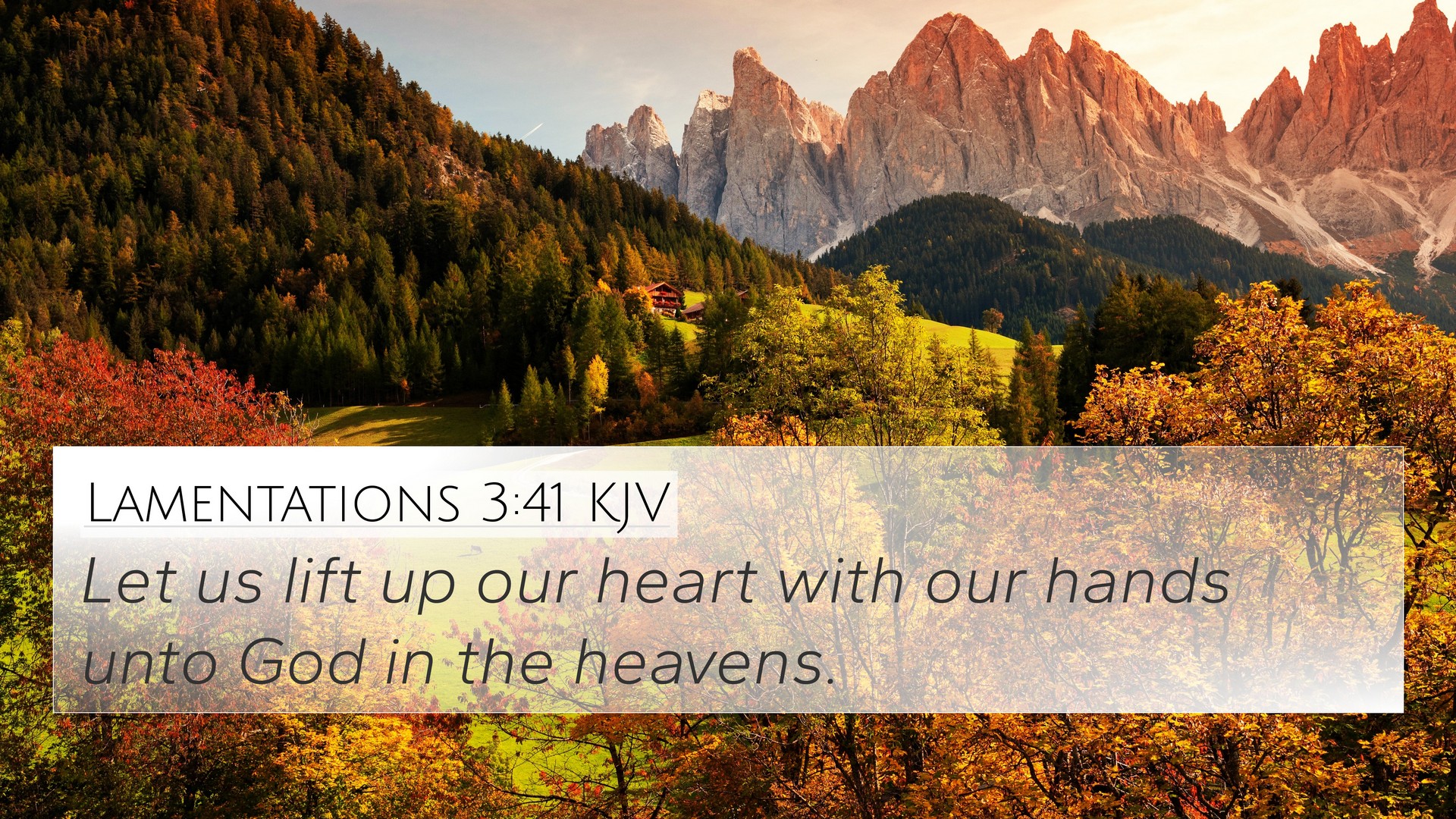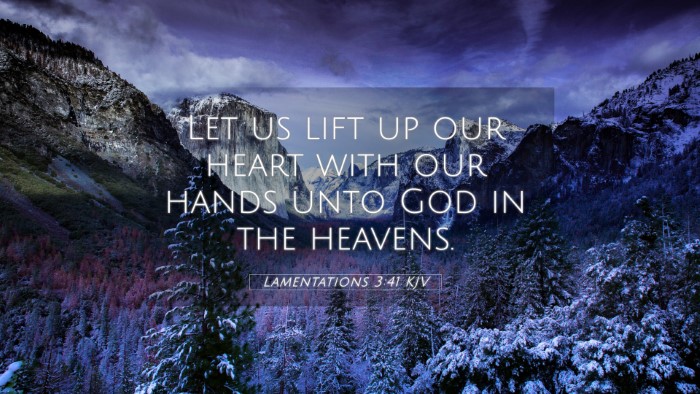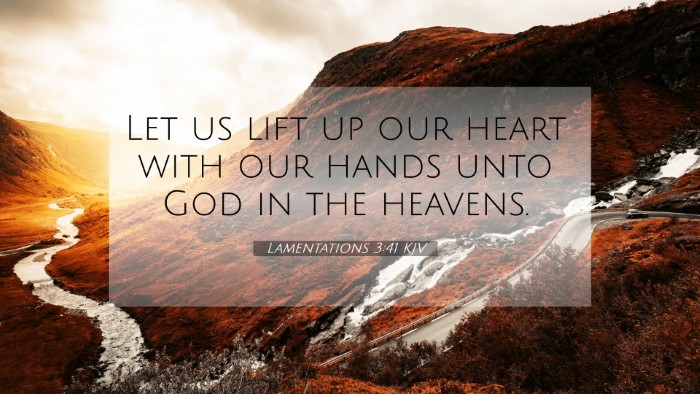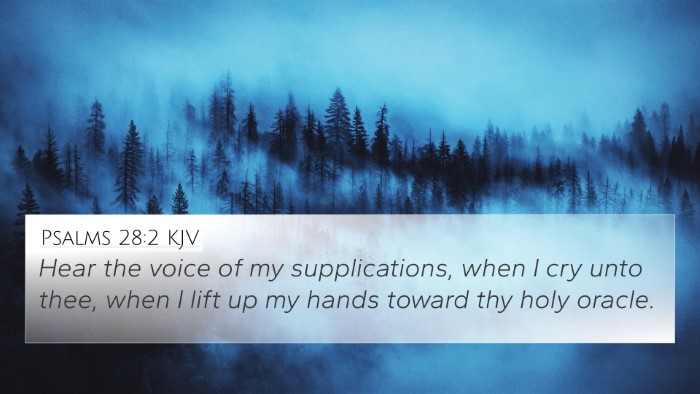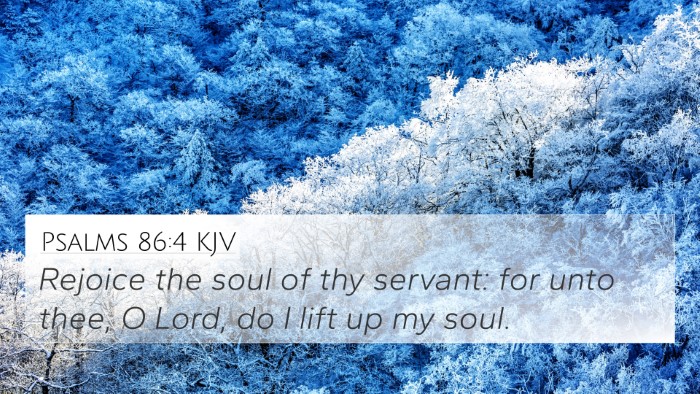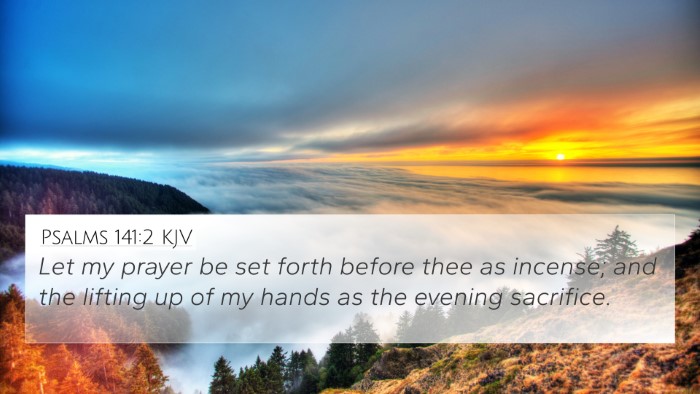Lamentations 3:41 - Biblical Interpretation and Meaning
Lamentations 3:41 states, "Let us lift up our heart with our hands unto God in the heavens." This verse not only encourages the act of lifting our hands in worship but emphasizes the posture of the heart toward God. This combines a physical action with an inner spiritual condition, demonstrating the holistic nature of true worship.
Summary of Lamentations 3:41
The verse highlights the necessity of sincere worship, where both heart and hands are raised to God, symbolizing a full surrender to Him. This reflects the emotional and spiritual distress experienced by the author, likely in a moment of corporate lament over the suffering of Israel.
Commentary Insights
-
Matthew Henry's Commentary:
Henry discusses the importance of heart and hands uniting in worship, suggesting that the act symbolizes a yearning for God. He notes that the lifting of hands serves as both a plea for mercy and an acknowledgment of God's sovereignty.
-
Albert Barnes' Notes:
Barnes emphasizes the communal aspect of this verse, inferring that it may not only apply individually but also collectively, guiding the Israelites to return their hearts to God, moving beyond mere ritual to genuine faith.
-
Adam Clarke's Commentary:
Clarke offers a deeper exploration of the syntax and the Hebrew roots, suggesting that the physical act of raising hands reflects an inner desire and submission to God, indicating a state of penitence and longing for restoration.
Cross-References and Thematic Connections
Understanding Lamentations 3:41 can also be enriched by recognizing its connections with several other Bible verses. Below are 10 cross-references that illustrate thematic links with this verse, enhancing our understanding of worship and relationship with God.
-
Psalms 28:2: “Hear the voice of my supplications when I cry unto Thee, when I lift up my hands toward Thy holy oracle.”
This verse similarly represents the act of raising hands as a sign of longing for God’s attention.
-
Psalms 63:4: “Thus will I bless Thee while I live: I will lift up my hands in Thy name.”
This demonstrates the commitment of worship through physical expressions of praise.
-
Psalms 141:2: “Let my prayer be set forth before Thee as incense; and the lifting up of my hands as the evening sacrifice.”
This reflects the symbolism of raising hands in the context of offering and prayer.
-
1 Timothy 2:8: “I will therefore that men pray everywhere, lifting up holy hands, without wrath and doubting.”
This New Testament passage reiterates the importance of the posture of prayer and worship.
-
Exodus 9:29: “And Moses said unto him, As soon as I am gone out of the city, I will spread abroad my hands unto the LORD; and the thunder shall cease.”
This verse conveys the act of raising hands as a way of invoking divine intervention.
-
Isaiah 1:15: “And when ye spread forth your hands, I will hide mine eyes from you: yea, when ye make many prayers, I will not hear: your hands are full of blood.”
This serves as a warning that the act of lifting hands must be paired with purity of heart.
-
James 4:8: “Draw nigh to God, and He will draw nigh to you. Cleanse your hands, ye sinners; and purify your hearts, ye double-minded.”
This represents the necessity of internal purity paired with outward expressions of faith.
-
Psalms 134:2: “Lift up your hands in the sanctuary, and bless the LORD.”
This is a call to collective worship, inviting the congregation to participate in worship actively.
-
Hebrews 10:22: “Let us draw near with a true heart in full assurance of faith, having our hearts sprinkled from an evil conscience, and our bodies washed with pure water.”
This underscores the combined approach of both heart and actions in drawing near to God.
-
Nehemiah 8:6: “And Ezra blessed the LORD, the great God. And all the people answered, Amen, Amen, with lifting up their hands: and they bowed their heads, and worshipped the LORD with their faces to the ground.”
This portrays a communal act of worship that reflects both reverence and joy.
Conclusion
Lamentations 3:41 presents profound insights into the spiritual act of worship, revealing the necessity of aligning our outward expressions with our inner thoughts and feelings. By exploring related verses, we deepen our understanding of God’s expectations for our worship and the sincerity required in approaching Him. Cross-referencing these scriptures enhances the richness of our biblical study and encourages a more profound engagement with the themes of lament, worship, and repentance found throughout the Bible.
References for Further Study
- Tools for Bible cross-referencing
- Bible concordance
- Bible cross-reference guide
- Cross-reference Bible study
- How to use Bible cross-references
